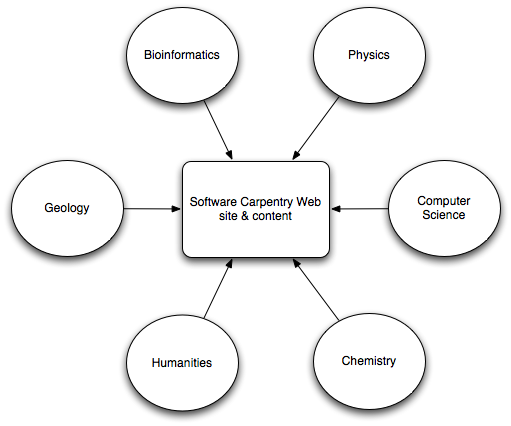After my recent next-gen sequencing course, which was supposed to tie into the whole software carpentry (SWC) effort but didn't really succeed in doing so the first time through, I started thinking about the Right Way to tie in the SWC material. In particular, how do you both motivate scientists to look at the SWC material, and (re)direct people to the appropriate places?
It's not clear that a Plan is in place. Greg Wilson seems to assume that scientists will find at least some of the material immediately obviously usable, but I think he's targetted at a more sophisticated population of users -- physicists and the like. My experience with bioinformaticians, however, is that they either come from straight biology backgrounds (with little or no computational background and rather limited on-the-job training), straight computation backgrounds (with very little biology), or physics (gonzo programming skills, but no biology). The latter fit neatly into the SWC fold, but they (we ;) are rare in biology. I think computer scientists and biologists are going to need guidance to dive into SWC at an early enough time for it to be the most rewarding.
So, what's a good model for SWC to guide scientists from multiple disciplines into the appropriate material? It's obviously not going to be possible to have Greg et al. tailor the SWC material to individual subgroups -- he doesn't know much (any ;) biology, for example. I don't have the time, patience, or skillset to integrate my next-gen notes into his SWC material, either. So, instead, I propose the hub & spokes model!

Here, the "hub" is the SWC material, and the spokes are all of the individual disciplines.
Basically, the idea is that individual sites (like my own ANGUS site on next-gen sequencing, http://ged.msu.edu/angus/) will develop their own field-specific content, and then link from that content into the SWC notes. This way the experts with feet in both fields can link appropriately, and Greg only has to worry about making the central content general -- which he's already doing quite well, I think. Yes, It's more work than asking Greg to do it, but frankly I'm going to be happy with a kick-ass central SWC site to which I can link -- right now it's dismayingly challenging to teach students why this stuff matters and how to learn it.
From the psychosocial perspective, it's a great fit. Students can get hands on tutorials on how to do X, Y, and Z in their own field -- and then connect into the SWC material to learn the background, or additional computational techniques in support of it. Motivation first!
What do we need SWC to do to support this? Not much -- basically, the central SWC notes need to be stable enough (with permalinks) that I can link into them from my own site(s) and not have to worry about the links becoming broken or (worse) silently migrating in topic. There are other solutions (wholesale incorporation of SWC into my own notes, for example) but I think the permalink idea is the most straightforward. Oh, and we should have a Greg-gets-hit-by-a-bus plan, too; at some point he's going to move on from SWC (perhaps when his lovely wife decide she's had enough and he needs to stop obsessing over it, or perhaps under more dire circumstances ;( and it would be good to know who holds the domain and site keys.
Thoughts? Comments?
--titus
Legacy Comments
Posted by JN on 2010-07-06 at 09:27.
It seems that the hub & spokes is hardly a proposal since: - the spokes are completely independent, do not need any coordination, and do not benefit from any synergy. - the model calls for Greg to do exactly what he has been doing with SWC, except for the part of not getting hit by a bus. Thus the proposal is: you will carry on according to your plan, and if anyone else would like to join you, it won't change your path a bit.
Posted by Titus Brown on 2010-07-06 at 10:01.
JN, yes, exactly. Well, and he needs to be careful about permalinks, too.
Comments !